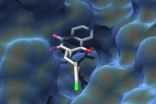(Press-News.org) This news release is available in German.
A research team led by Prof. Dr. Carola Hunte of the University of Freiburg/ Germany has succeeded in describing how the antimalarial drug atovaquone binds to its target protein. The scientists used x-ray crystallography to determine the three-dimensional structure of the protein with the active substance bound. The drug combination atovaquone-proguanil (Malarone®) is a medication used worldwide for the prevention and treatment of malaria. The data and the resulting findings concerning the mode of action of atovaquone could lead to improved medications against the tropical disease. Hunte and her team conducted the research at the Institute for Biochemistry and Molecular Biology of the Faculty of Medicine and the Centre for Biological Signalling Studies BIOSS at the University of Freiburg. The scientists published their findings in the journal Nature Communications.
Malaria is one of the most dangerous tropical diseases in the world. Anopheles mosquitoes infected with Plasmodium species – unicellular parasites – transmit the disease by biting. Atovaquone blocks a protein of the respiratory chain in the mitochondria, the power plants of the cell, thus killing off the parasites. However, the pathogen is susceptible to mutations so that drug resistant strains are arising and spreading. The Freiburg scientists have now paved the way for the development of improved drugs by revealing the precise binding mode of atovaquone to the target protein. They used the mitochondrial protein from cells of baker's yeast for their analyses due to its close resemblance to the parasitic protein.
The target protein of atovaquone is the third of four enzymes of the respiratory chain in the mitochondrion. The amino acid chains of the protein form a three-dimensional pocket. The molecule of the active substance fits perfectly into this pocket, binding to amino acids at numerous positions. These interactions are crucial for the effect atovaquone has in Plasmodium cells, ultimately leading to the death of the pathogen. The researchers conducted a protein sequence analysis, revealing that most of these docking sites are identical in the pathogen, baker's yeast and in human cells. Atovaquone forms several bonds that are specific to the Plasmodium protein in the open area of the binding pocket. In addition, the structural analysis revealed the molecular basis of resistances: Due to mutations that change the structure of the target protein, the substance cannot reach the designated binding mode – it doesn't fit perfectly into the pocket anymore.
The data provides an important basis for improving antimalarial drugs. Scientists could now modify the molecular structure of atovaquone by means of structure-based drug design, ensuring that the active substance forms necessary bonds – and that the pathogen is no longer resistant to it.
INFORMATION:
Original publication:
Birth, D., Kao, W.-C., & Hunte, C. (2014). Structural analysis of atovaquone-inhibited cytochrome bc1 complex reveals the molecular basis of antimalarial drug action. Nat Commun, 5 http://dx.doi.org/10.1038/ncomms5029
Contact:
Prof. Dr. Carola Hunte
Institute of Biochemistry and Molecular Biology / BIOSS Centre for Biological Signalling Studies
University of Freiburg
Phone: +49 (0)761/203-5279
E-Mail: carola.hunte@biochemie.uni-freiburg.de
Toward a better drug against malaria
Freiburg structural biologists explain on the molecular level, how the drug atovaquone acts on the pathogen of the disease
2014-06-06
ELSE PRESS RELEASES FROM THIS DATE:
Football for untrained 70-year-old men
2014-06-06
Research carried out by the Copenhagen Centre for Team Sport and Health in Denmark shows that untrained elderly men get markedly fitter and healthier as a result of playing football (soccer). After only 4 months of twice-weekly 1-hour training sessions, the men achieved marked improvements in maximum oxygen uptake, muscle function and bone mineralization.
Later today, three scientific articles will be published in the Scandinavian Journal of Medicine & Science in Sports describing the fitness and health effects of football training for 63‒75-year-old untrained men. ...
Deadly diseases overlooked for too long, scientists say
2014-06-06
Decades of neglect have allowed infectious diseases to devastate the lives of thousands of people in the developing world, a study reveals.
Researchers say three diseases in particular – anthrax, brucellosis and bovine tuberculosis – have failed to receive the official recognition and funding needed to combat them effectively.
All three impact greatly on human and animal health in developing nations, posing a major threat to safe and plentiful food supplies.
The disorders – known as zoonotic diseases – are spread between animals and humans. They are common ...
Saving trees in tropics could cut emissions by one-fifth, study shows
2014-06-06
Reducing deforestation in the tropics would significantly cut the amount of carbon dioxide emitted into the atmosphere – by as much as one-fifth – research shows.
In the first study of its kind, scientists have calculated the amount of carbon absorbed by the world's tropical forests and the amounts of greenhouse gas emissions created by loss of trees, as a result of human activity.
They found that tropical forests absorb almost two billion tonnes of carbon each year, equivalent to one-fifth of the world's carbon emissions, by storing it in their bark, leaves and soil. ...
York scientists provide new insights into biomass breakdown
2014-06-06
Scientists at the University of York are playing a key role in the quest for a better understanding of how a recently discovered family of enzymes can degrade hard-to-digest biomass into its constituent sugars.
The enzymes – lytic polysaccharide monooxygenases (LPMOs) – are secreted by both fungi and bacteria and have the ability to 'chip away' at cellulose and other intractable materials. This allows cellulosic materials such as plant stems, wood chips and cardboard waste, as well as other tricky polysaccharides such as insect/crustacean shells, to be broken down.
Finding ...
Infection in malaria-transmitting mosquito discovered
2014-06-06
Boston, MA – Researchers have found the first evidence of an intercellular bacterial infection in natural populations of two species of Anopheles mosquitoes, the major vectors of malaria in Africa. The infection, called Wolbachia, has been shown in labs to reduce the incidence of pathogen infections in mosquitoes and has the potential to be used in controlling malaria-transmitting mosquito populations.
"Wolbachia is an interesting bacterium that seems perfectly suited for mosquito control. However, there were strong doubts that it could ever be used against field Anopheles ...
Three gene networks discovered in autism, may present treatment targets
2014-06-06
A large new analysis of DNA from thousands of patients has uncovered several underlying gene networks with potentially important roles in autism. These networks may offer attractive targets for developing new autism drugs or repurposing existing drugs that act on components of the networks.
Furthermore, one of the autism-related gene pathways also affects some patients with attention-deficit hyperactivity disorder (ADHD) and schizophrenia—raising the possibility that a class of drugs may treat particular subsets of all three neurological disorders.
"Neurodevelopmental ...
Asymmetric continental margins and the slow birth of an ocean
2014-06-06
When South America split from Africa 150 to 120 million years ago, the South Atlantic formed and separated Brazil from Angola. The continental margins formed through this separation are surprisingly different. Along offshore Angola 200 km wide, very thin slivers of continental crust have been detected, whereas the Brazilian counterpart margin features an abrupt transition between continental and oceanic crust.
For decades, geoscientists have struggled to explain not only why the amount of thinning and the geometries of opposite rifted continental margin are not symmetric, ...
Text messaging program helps smokers fight the urge to light up
2014-06-06
WASHINGTON, DC (June 6, 2014) — More than 11 percent of smokers who used a text- messaging program to help them quit did so and remained smoke free at the end of a six- month study as compared to just 5 percent of controls, according to a new report by researchers at Milken Institute School of Public Health at the George Washington University (Milken Institute SPH.)
"Text messages seem to give smokers the constant reminders they need to stay focused on quitting," says Lorien C. Abroms, ScD, MA, an associate professor of prevention and community health at Milken Institute ...
Sleep apnea tied to diabetes in large study
2014-06-06
In the largest study to date of the relationship between sleep apnea and diabetes, a new study of more than 8,500 Canadian patients has demonstrated a link between obstructive sleep apnea (OSA) and the development of diabetes, confirming earlier evidence of such a relationship from smaller studies with shorter follow-up periods.
"Our study, with a larger sample size and a median follow-up of 67 months was able to address some of the limitations of earlier studies on the connection between OSA and diabetes," said lead author Tetyana Kendzerska, MD, PhD, of the University ...
Newborns exposed to dirt, dander and germs may have lower allergy and asthma risk
2014-06-06
Infants exposed to rodent and pet dander, roach allergens and a wide variety of household bacteria in the first year of life appear less likely to suffer from allergies, wheezing and asthma, according to results of a study conducted by scientists at the Johns Hopkins Children's Center and other institutions.
Previous research has shown that children who grow up on farms have lower allergy and asthma rates, a phenomenon attributed to their regular exposure to microorganisms present in farm soil. Other studies, however, have found increased asthma risk among inner-city ...
LAST 30 PRESS RELEASES:
The long standing commercialization challenge of lithium batteries, often called the dream battery, has been solved.
New method to remove toxic PFAS chemicals from water
The nanozymes hypothesis of the origin of life (on Earth) proposed
Microalgae-derived biochar enables fast, low-cost detection of hydrogen peroxide
Researchers highlight promise of biochar composites for sustainable 3D printing
Machine learning helps design low-cost biochar to fight phosphorus pollution in lakes
Urine tests confirm alcohol consumption in wild African chimpanzees
Barshop Institute to receive up to $38 million from ARPA-H, anchoring UT San Antonio as a national leader in aging and healthy longevity science
Anion-cation synergistic additives solve the "performance triangle" problem in zinc-iodine batteries
Ancient diets reveal surprising survival strategies in prehistoric Poland
Pre-pregnancy parental overweight/obesity linked to next generation’s heightened fatty liver disease risk
Obstructive sleep apnoea may cost UK + US economies billions in lost productivity
Guidelines set new playbook for pediatric clinical trial reporting
Adolescent cannabis use may follow the same pattern as alcohol use
Lifespan-extending treatments increase variation in age at time of death
From ancient myths to ‘Indo-manga’: Artists in the Global South are reframing the comic
Putting some ‘muscle’ into material design
House fires release harmful compounds into the air
Novel structural insights into Phytophthora effectors challenge long-held assumptions in plant pathology
Q&A: Researchers discuss potential solutions for the feedback loop affecting scientific publishing
A new ecological model highlights how fluctuating environments push microbes to work together
Chapman University researcher warns of structural risks at Grand Renaissance Dam putting property and lives in danger
Courtship is complicated, even in fruit flies
Columbia announces ARPA-H contract to advance science of healthy aging
New NYUAD study reveals hidden stress facing coral reef fish in the Arabian Gulf
36 months later: Distance learning in the wake of COVID-19
Blaming beavers for flood damage is bad policy and bad science, Concordia research shows
The new ‘forever’ contaminant? SFU study raises alarm on marine fiberglass pollution
Shorter early-life telomere length as a predictor of survival
Why do female caribou have antlers?
[Press-News.org] Toward a better drug against malariaFreiburg structural biologists explain on the molecular level, how the drug atovaquone acts on the pathogen of the disease

